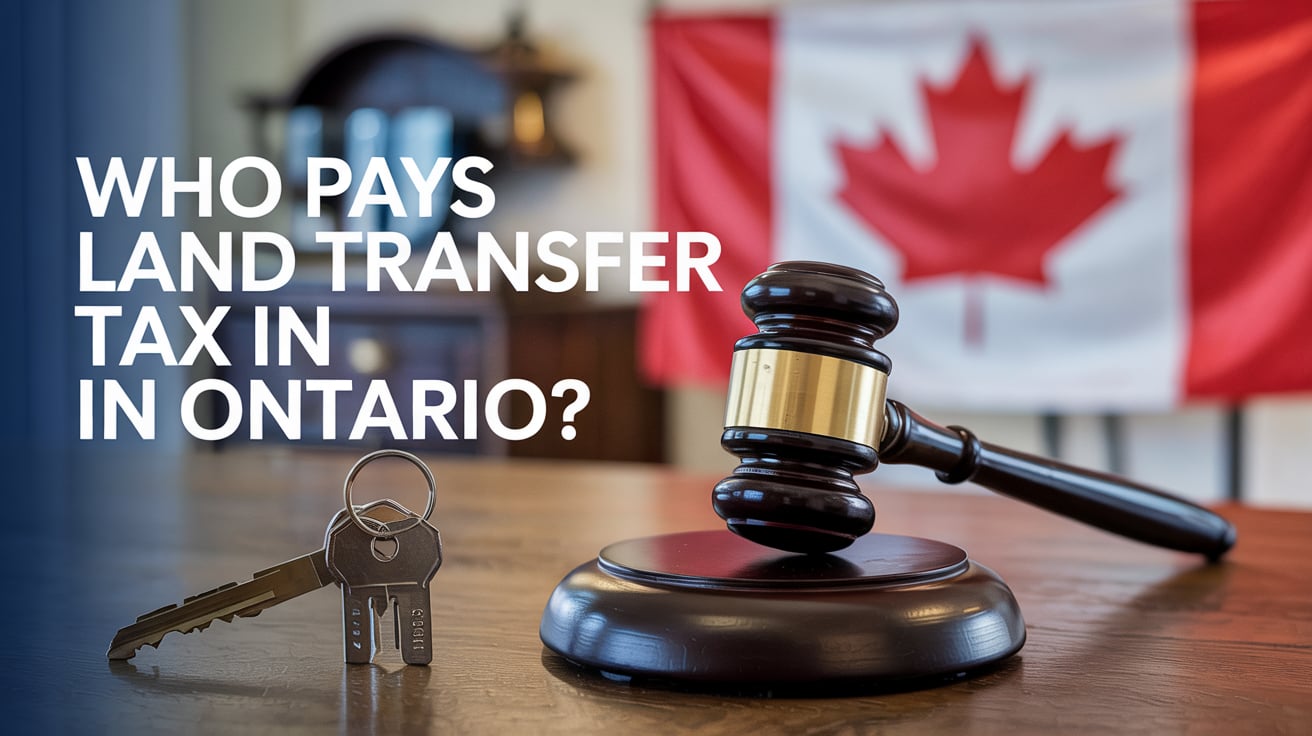
- Admin
- 04-Apr-2025
Buying a home in Ontario comes with various costs, including land transfer tax (LTT). This tax is a mandatory fee paid when a property changes ownership. Understanding who pays this tax, how much it costs, and whether exemptions apply can help buyers prepare financially.
LTT is one of the biggest closing costs that buyers need to budget for, and failing to account for it can lead to unexpected financial strain. The amount payable varies depending on the price of the property and its location. While the Ontario government imposes this tax across the province, certain cities like Toronto have an additional municipal land transfer tax.
Fortunately, for first-time home buyers, some rebates will reduce or eliminate LTT liability. Knowing the rules and possible exemptions can help buyers make informed decisions and avoid financial surprises during the closing process.
What is Land Transfer Tax Ontario?
Land transfer tax is a provincial tax applied to real estate purchases. The tax is calculated based on the purchase price of the property and must be paid when the title is transferred. In Ontario, buyers are responsible for paying the land transfer tax, while sellers are not required to pay this fee.
All forms of real estate, including commercial, industrial, and residential properties, are subject to this tax. Land transfer tax is a one-time payment that must be made at closing, in contrast to property tax, which is paid annually. The amount of tax due is determined by the property's value; more expensive homes are subject to higher rates under a progressive tax rate structure.
The additional municipal land transfer tax levied by some municipalities, such as Toronto, essentially doubles the tax burden on buyers in those areas. Prior to the property being formally registered in the buyer's name, the tax must be paid.
How Much is Land Transfer Tax in Ontario?
The amount of land transfer tax a buyer pays depends on the purchase price of the property. Ontario uses a tiered tax system:
- 0.5% on the first $55,000
- 1% on amounts between $55,000 and $250,000
- 1.5% on amounts between $250,000 and $400,000
- 2% on amounts between $400,000 and $2,000,000
- 2.5% on amounts above $2,000,000 (for residential properties)
For example, if you buy a home for $600,000, your land transfer tax would be calculated as follows:
- 0.5% on the first $55,000 = $275
- 1% on the next $195,000 = $1,950
- 1.5% on the next $150,000 = $2,250
- 2% on the remaining $200,000 = $4,000
Total land transfer tax: $8,475
Additional municipal land transfer tax applies in Toronto, effectively doubling the amount due. Buyers should consult with a real estate professional to estimate their tax liability and ensure they have enough funds for closing costs. This tax is quite overlooked by many homebuyers and it does cause financial hardship for them during the last stages of purchase. Knowing how it is calculated enables buyers to prepare for it and not be surprised.
Who is Responsible for Paying Land Transfer Tax?
In Ontario, land transfer tax must be paid by the buyer. On the day of the property purchase closing, the payment is due. It is part of the closing costs and needs to be paid in full before the ownership transfer is finalized.
Land transfer tax is not paid by sellers. They might, however, incur additional expenses like real estate commissions and legal fees. Along with other closing expenses like legal fees, title insurance, and home inspections, buyers should make sure they have enough money set aside for this tax.
Buyers must pay this tax out of pocket because lenders usually do not finance it. As a result, setting up a budget before buying a home is crucial. When buyers qualify for rebates, they should apply as soon as possible in order to get some of the tax back. To guarantee adherence to all tax laws and prevent needless delays, buyers should collaborate closely with their attorneys or real estate brokers.
First-Time Home Buyer Rebate
Ontario offers a rebate on land transfer tax for first-time home buyers. Eligible buyers can receive a rebate of up to $4,000. To qualify:
- The buyer is at least 18 years old.
- The buyer has never owned a home in the world.
- The buyer’s principal residence of the property must be set within nine months after purchase.
- At least one of the many buyers, however, must also qualify for the full rebate.
If you spend $368,000 or less on a home, you will receive a full refund of the land transfer tax. When the value of the home is higher, the rebate lowers the maximum tax that must be paid.
First-time buyers may find homeownership more accessible as a result of this rebate, which can drastically lower the upfront costs of buying a home. To be eligible for the rebate, at least one of the buyers in a joint home purchase must fulfill all eligibility requirements. To avoid requiring qualified buyers to pay the entire tax up front and then request reimbursement, the rebate is applied straight to the land transfer tax amount.
Buyers must apply during the property registration process via the Ontario Ministry of Finance or their attorney in order to be eligible for the rebate. Approval requires appropriate documentation demonstrating eligibility.
Also Read: - What is chattel in real estate
Additional Land Transfer Tax in Toronto
Buyers in Toronto are required to pay an additional Municipal Land Transfer Tax (MLTT). This tax has the same tiered structure as the provincial tax in Ontario. This effectively doubles the amount owed because buyers in Toronto pay both the municipal tax and the Ontario land transfer tax. First-time buyers in Toronto may also qualify for a rebate of up to $4,475.
If a buyer spends $800,000 on a home in Toronto, they will owe provincial and municipal land transfer taxes. If the total amount of taxes owed is more than $20,000, the price of buying a home would make a big difference. For buyers who are planning to buy real estate in Toronto, they must budget for this additional tax.
Speaking with a legal expert can help ascertain eligibility for rebates and ensure that the proper amount is paid at closing. Buyers should know ahead of time since failing to budget for this tax can seriously strain finances. Professional advice will allow you to make informed decisions and avoid wasting money on things you might not plan for.
Exemptions from Land Transfer Tax
The land transfer tax does not apply to some property transfers, including:
- Transfers between spouses: The tax may not apply if property is transferred between spouses.
- Transfers from a parent to a child: There may be some other family transfers that are exempted.
- Corporate reorganizations : Some business related property transfers are exempt under corporate reorganizations.
- Farming properties transferred within a family: Land transfer tax may be exempt on agricultural properties transferred within a family.
While these exemptions have restrictions which are why it is best to consult legal counsel to ensure that you qualify. For example, if it’s a parent to child transfer the exemption may only apply if no money actually changed hands. To be eligible, corporate transfers must also follow strict government regulations. A real estate attorney will be able to give you advice that will guarantee eligibility and prevent you from incurring any unforeseen tax obligations.
How to Pay Land Transfer Tax
Instead of paying the land transfer tax through your lawyer, you pay that to the Ontario government. When closing on a property, your lawyer will see to it that you are due exactly the amount it’s paid. It is a tax that needs to be paid before the property title property is registered in your name.
This amount is paid within the overall closing costs, and settled along with the legal transaction. If not, it could delay transfer of ownership. In certain cases, buyers will be required to present payment proof before keys for the new home can be issued. Getting advice from a lawyer or an agent to help you though this process could save you from any pitfalls at the closing.
Also Read: - Agreement of purchase and sale in ontario
Conclusion
Land transfer tax Ontario is a key part of home buying in Ontario. Buyers, not sellers, are responsible for paying this tax. The cost depends on the property price, with additional charges for homes in Toronto. First-time buyers may qualify for rebates that reduce the tax burden. Understanding these costs ensures buyers are financially prepared for closing.
Why Choose Us for Your Real Estate Legal Needs?
Buying a home is a big step, and you need expert guidance to navigate the process. Our experienced legal team ensures a smooth transaction, handling everything from tax calculations to closing paperwork. Let us take the stress out of buying your dream home with reliable and professional service. Contact us today to get started!

